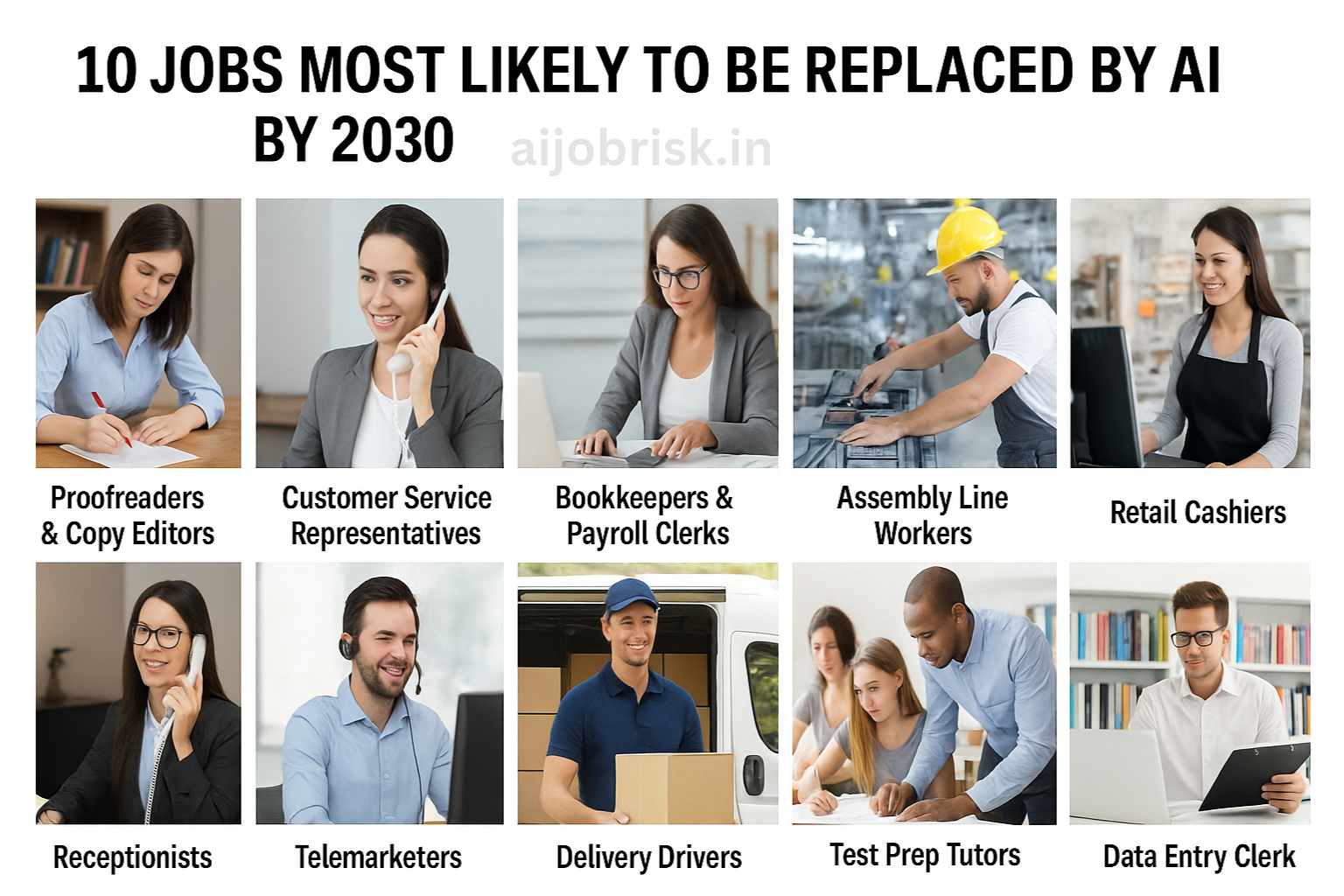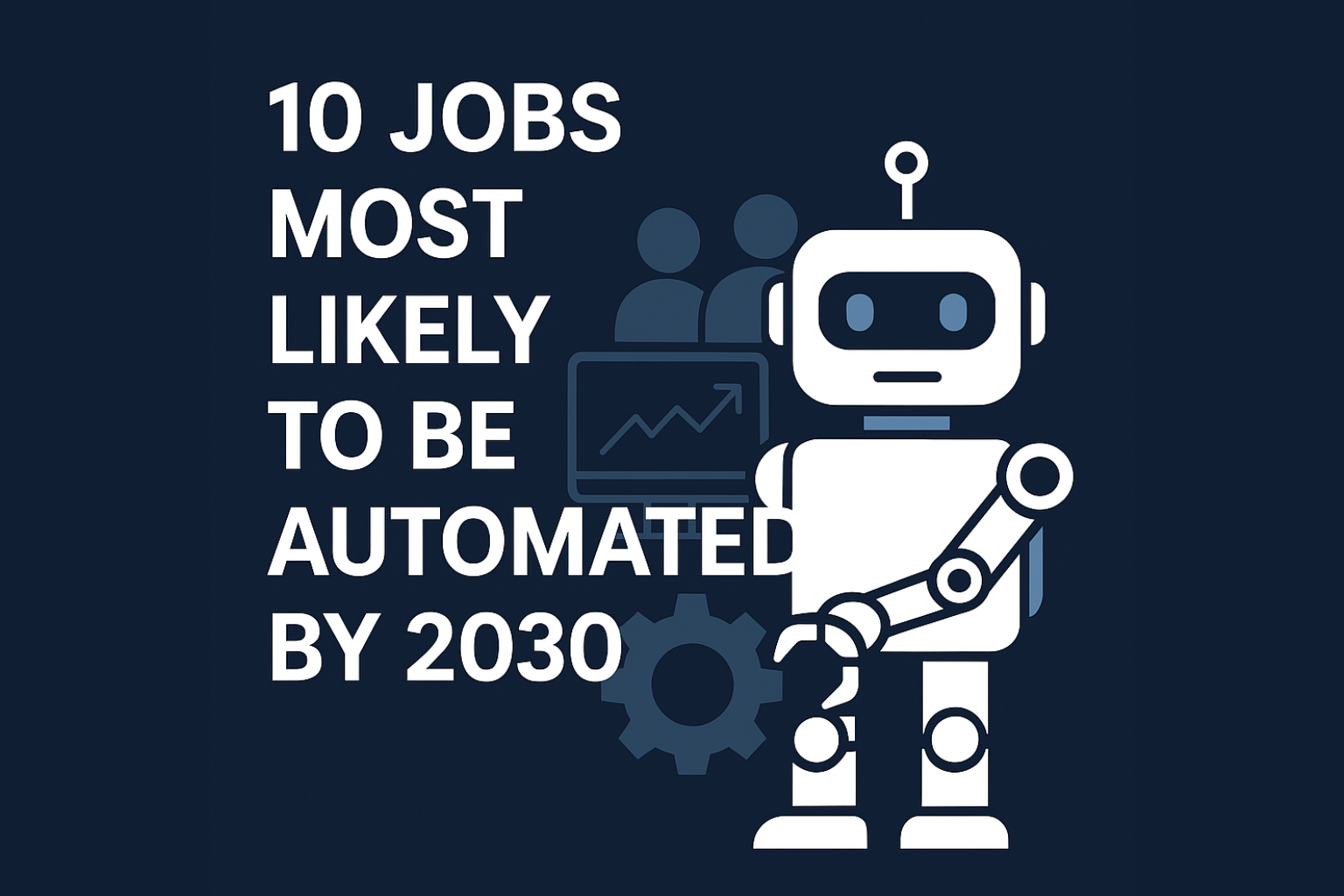Automation Isn’t Science Fiction Anymore!
AI is no longer just a buzzword or some distant sci-fi dream. It’s already here — in chatbots, self-checkouts, online banking, and even hiring systems. While technology brings plenty of benefits, it’s also starting to change how we work — and who gets to work.
If you’re worried that your job might be replaced by AI or automation, you’re not alone. In this post, we break down 10 jobs that are most at risk of being automated by 2030, based on current trends, research, and what we’re seeing in the real world.
10 Jobs AI Will Replace by 2030 –
1. Data Entry Clerks – First Jobs Being Replaced by AI and Automation
This job is already being replaced in many industries. Tools like OCR (Optical Character Recognition) and Robotic Process Automation can scan documents, extract data, and fill spreadsheets far quicker than humans. Banks now process loan applications automatically, hospitals digitize patient records without manual typing, and e-commerce sites use scripts to update thousands of product listings in minutes. Manual data entry is becoming rare.
- Why at risk: Highly repetitive and rules-based.
- Safe tip: Learn Excel automation, Google Sheets scripts, or transition into data analysis roles that require human decision-making.
- For example, creating Excel macros that update full reports automatically or using Google Sheets scripts to clean and organize thousands of records in minutes.
2. Telemarketers – Why AI Voice Bots Are Automating Cold Calls
The days of constant cold calls are fading fast. AI-powered voice assistants and chatbots can now pitch products, answer questions, and even handle objections — all without taking a tea break. Modern AI can analyze customer data, personalize the pitch in real-time, and make thousands of calls simultaneously. For businesses, it’s faster, cheaper, and often more effective than hiring large call center teams. As more people screen calls and prefer online interactions, the role of human telemarketers is shrinking rapidly.
- Why at risk: Script-based, repetitive, and measurable tasks are easy for AI to take over.
- Safe tip: Transition into consultative sales, customer relationship management, or digital marketing roles where building trust and emotional connection still matters.
- For example, selling high-value B2B software, luxury products, or services where trust and personal relationships matter.
3. Bookkeepers & Payroll Clerks – Accounting Roles at Risk of AI Replacement
Routine financial record-keeping is no longer the secure career path it once was. AI-driven accounting software like QuickBooks, Xero, and even cloud-based payroll systems can now manage invoices, reconcile bank statements, track expenses, and process employee salaries with minimal human input. These tools are fast, accurate, and available 24/7 — making them very attractive for small businesses and large corporations alike. While complex financial strategy still requires human expertise, the day-to-day number crunching is being automated at lightning speed.
- Why at risk: Repetitive data management tasks can be easily handled by accounting AI.
- Safe tip: Move toward financial analysis, advisory roles, or specialize in tax law where interpretation and personalized advice are still in demand.
- For example, advising small businesses on tax planning, helping startups set up accounting systems, or offering specialized payroll consulting.
4. Assembly Line Workers – How Robots and AI Are Transforming Manufacturing Jobs
Factories are rapidly replacing human hands with robotic arms and AI-powered machinery. These advanced systems can assemble products, inspect for defects, and even adjust to production changes faster than a human worker. Robots don’t tire, take breaks, or call in sick — making them a cost-effective option for manufacturers aiming for speed and precision. Industries like electronics, automotive, and consumer goods are leading the charge in this transformation. While there will still be roles for human oversight, many traditional assembly positions are being phased out.
- Why at risk: Highly repetitive, physical tasks are ideal for automation.
- Safe tip: Transition into machine maintenance, quality control, or robotics programming where human skills complement automation.
- For example, programming and repairing factory robots or inspecting automated production lines for quality and safety.
5. Retail Cashiers – Self-Checkout and AI Are Taking Over Checkout Counters
Self-checkout machines, mobile payment apps, and AI-powered kiosks are transforming retail checkout counters worldwide. Many large supermarkets and stores now let customers scan and pay for their items without any human interaction. These systems work quickly, reduce waiting times, and operate without breaks — making them highly appealing for businesses. While some stores still keep human cashiers for customer service or complex transactions, the trend is clearly moving toward automation.
- Why at risk: Routine scanning and payment tasks can be fully automated with self-service and AI checkout technology.
- Safe tip: Shift toward customer experience roles, store management, or product merchandising — areas that require personal interaction and decision-making.
- For example, working as a store ambassador who helps customers choose products or managing stock levels to keep shelves full.
6. Receptionists – Front Desk Roles Being Automated by Chatbots and Kiosks
The friendly face at the front desk is increasingly being replaced by technology. Self-check-in kiosks, AI-powered chatbots, and automated booking systems can now greet guests, manage reservations, answer basic questions, and even process payments. In many modern hotels and offices, visitors can sign in, get directions, and receive updates without ever speaking to a human. While personal interaction still matters in luxury and high-touch environments, routine front desk duties are rapidly being automated to save costs and speed up service.
- Why at risk: Many reception tasks are predictable, repetitive, and easy to handle through automation.
- Safe tip: Shift into guest experience roles, event coordination, or hospitality management where human connection and problem-solving remain essential.
- For example, organizing corporate events, handling VIP guest experiences, or managing complex scheduling for executives.
7. Customer Service Representatives – AI Chatbots and Voice Assistants Are Redefining Support Jobs
Answering calls, replying to emails, and handling basic customer questions are tasks AI is learning to do remarkably well. Chatbots, voice assistants, and automated ticketing systems can now resolve common issues instantly and handle large volumes of requests without fatigue. Many companies are moving to AI-first support models, where human agents step in only for complex or sensitive cases. This shift saves businesses time and money but reduces the need for large human support teams.
- Why at risk: Most routine queries can be solved quickly by AI without human involvement.
- Safe tip: Specialize in technical support, customer success management, or complaint resolution — areas that require empathy, negotiation, and deeper problem-solving.
- For example, solving escalated complaints, giving personalized product recommendations, or managing premium accounts.
8. Delivery Drivers – Driverless Cars, Drones, and the Future of Last-Mile Delivery
From groceries to parcels, short-distance deliveries in cities are increasingly being handled by automation. Self-driving vans, delivery robots, and drone systems are already being tested and deployed in many urban areas. These technologies can navigate efficiently, work around the clock, and avoid many human limitations such as fatigue or delays. While rural or complex deliveries still benefit from human drivers, routine city drop-offs are likely to be dominated by autonomous systems in the near future.
- Why at risk: Urban deliveries follow predictable routes and are ideal for driverless technology.
- Safe tip: Move into logistics coordination, fleet maintenance, or roles involving specialized deliveries that require human handling and care.
- For example, overseeing fleet operations, planning efficient delivery routes, or handling fragile medical deliveries requiring human oversight.
9. Proofreaders & Copy Editors – How AI Writing Tools Threaten Editing Jobs
Basic proofreading — checking grammar, spelling, and punctuation — is now done quickly and accurately by AI tools like Grammarly, Microsoft Editor, and ChatGPT-based services. These tools can process large amounts of text instantly, offer style suggestions, and even rewrite content to match a specific tone. While human editors are still essential for creative writing, nuanced language, or fact-checking, the demand for basic proofreading is shrinking fast as businesses turn to automated solutions.
- Why at risk: Routine grammar and spelling checks can be done faster and cheaper by AI.
- Safe tip: Focus on high-value editing such as developmental editing, fact-checking, or industry-specific content that requires expertise and a human touch.
- For example, specializing in editing legal contracts, medical research papers, or novels where accuracy and tone are critical.
10. Test Prep Tutors (SAT, GRE, etc.) – AI Learning Platforms Replacing Traditional Coaching
Helping students prepare for standardized exams like SATs, GREs, or competitive entrance tests has traditionally been a human-driven role. But AI-powered learning platforms now offer personalized study plans, instant feedback, and adaptive practice questions that adjust to a student’s progress. These tools can simulate real test conditions, track weak areas, and provide targeted exercises — often at a fraction of the cost of a human tutor. While some students still value live coaching, the demand for basic test preparation is shifting toward automated platforms.
- Why at risk: Many test prep tasks are repetitive and can be delivered effectively through AI-based learning systems.
- Safe tip: Specialize in one-on-one mentoring, advanced subject coaching, or helping students with test anxiety and strategy — areas where human encouragement and adaptability make a big difference.
- For example, teaching exam time-management strategies, boosting student confidence, or offering live practice interviews for admissions.
What Should You Do Now?
If your job — or someone you care about — is on this list, it’s not the end of the road. It’s your signal to prepare.
Awareness + Action = Job Security
✅ Check your job’s AI risk instantly at AIJobRisk.in — free, no sign-up.
✅ Learn future-proof skills like advanced communication, creative problem-solving, and smart use of digital tools.
✅ Stay updated — follow our blog for safe career paths, new job opportunities, and practical upskilling guides.
✅ Upskill into areas requiring human creativity, emotional intelligence, and problem-solving.
✅ Learn AI collaboration (how to use AI to enhance work, not replace it).
✅ Pivot into AI-resistant sectors (e.g., healthcare, skilled trades, leadership roles).
The earlier you adapt, the more valuable you’ll be in the AI-driven workplace. Your future career isn’t decided by AI — it’s decided by what you do today.
Final Thoughts
The goal isn’t to scare you — it’s to prepare you. Technology is moving fast, but so can you.
With the right mindset and future-proof skills, you can stay relevant — and even thrive in the age of AI.
The safest careers will be those that blend human strengths with AI tools, creating a future where technology supports — not replaces — people. Choosing career paths that rely on human connection, judgment and critical thinking.
The future of work belongs to those who adapt. Check your AI job risk, start learning one new skill this week, and keep moving forward.
Read our full analysis on IMF & AI jobs impact in India (2025)” → https://aijobrisk.in/ai-impact-jobs-india-2025/
FAQs
Q1. Which jobs are most safe from AI in the future?
Jobs that require creativity, emotional intelligence, and complex problem-solving are least likely to be automated. Examples include healthcare professionals, teachers, skilled trades, and leadership roles where human judgment is critical.
Q2. Will AI create new jobs by 2030?
Yes. While some roles will decline, AI is also expected to create entirely new job categories. According to the World Economic Forum, AI could replace 85 million jobs by 2025 but create 97 million new ones, especially in tech, data, cybersecurity, and AI ethics.
Q3. How can I make my job more secure against AI replacement?
The best way to stay safe is to focus on skills AI struggles with — like creativity, empathy, and leadership. Continuous learning, reskilling, and combining AI tools with human strengths will make your career future-proof.
Q4. Is AI really going to replace all human jobs?
No. AI will automate certain tasks, but it won’t fully replace humans in most industries. Instead, it will likely change how we work, with humans and AI collaborating. Roles that require human connection, judgment, and innovation will remain.
Q5. What skills should I learn to stay future-proof?
In-demand skills include data literacy, critical thinking, digital communication, creativity, and adaptability. Soft skills like teamwork and emotional intelligence will also be highly valuable. Pairing these with AI and tech knowledge will help you thrive in the future job market.


